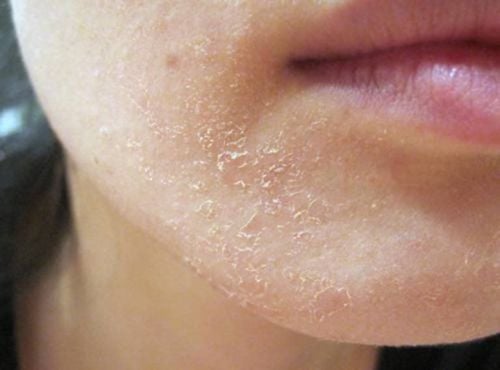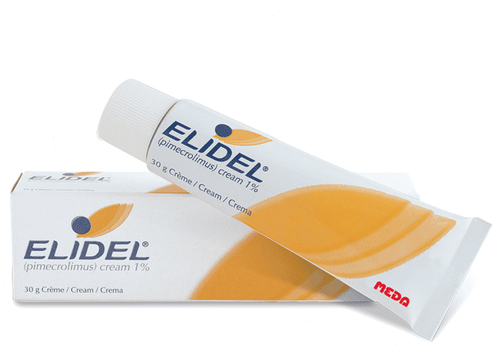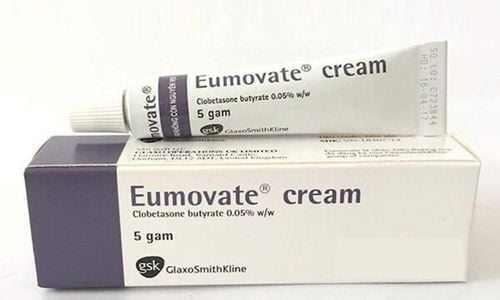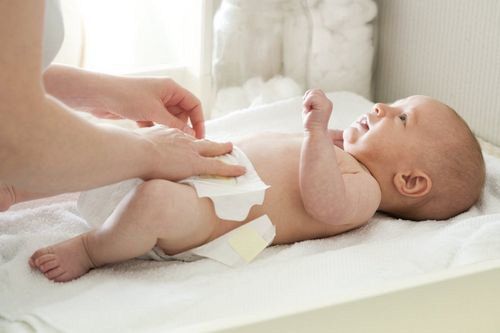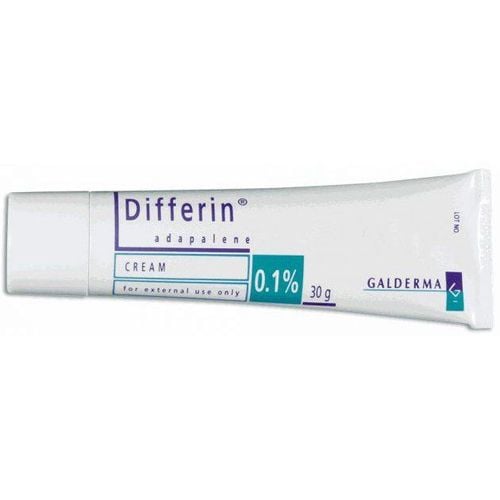This is an automatically translated article.
Infantile seborrheic dermatitis (ISD) (also known as 'seborrheic dermatitis') is a common skin condition that is common in infants, appears before 3 months of age, and usually resolves on its own by 6 months. -12 months. Seborrheic dermatitis commonly causes redness and a patchy, greasy scaly rash in infants and young children.The disease usually occurs on areas of the skin where the sebaceous glands are more active, i.e. the hairy areas and the interstitial spaces (the parts of the skin that rub against each other). Seborrheic dermatitis in infants often involves the scalp, and is often referred to as cradle cap, because the scaly patches on a red, inflamed background can become thicker and clustered, like a hat.
1. What is cradle cap seborrheic dermatitis?
Cradle cap is an inflammatory skin condition that often appears on the scalp of babies. The scientific name for this condition is infantile seborrheic dermatitis. They appear in about 10% of infants, most often between the ages of 3 weeks and 12 months. Seborrheic dermatitis in babies is characterized by signs such as a baby's scalp that is yellow or brown, scaly, or scaly that looks like dandruff....Parents can also recognize the same condition. Likewise, in other oily areas, such as around the ears or eyebrows of a child, eyelids, even under the armpits and other skin wrinkles, seborrheic dermatitis can also appear. Sometimes they can even appear in diaper areas, confusing parents with diaper rash. Seborrheic dermatitis in children is harmless and not contagious. Seborrheic dermatitis may not bother your child with activities of daily living. Although they can be very itchy if they become severe, they generally don't affect your baby's health.

Nắp nôi là tình trạng viêm da thường xuất hiện trên da đầu của các em bé
2. How long does seborrheic dermatitis in children usually last?
Infantile seborrheic dermatitis usually clears up on its own by the time a child is 6 to 12 months old, although it can last longer in some babies, even until school starts.3. What causes seborrheic dermatitis in children?
Currently, experts in pediatric dermatology have not been able to find the cause of seborrheic dermatitis. But parents of children need to know that seborrheic dermatitis is not caused by poor hygiene or allergies or skin irritation.Some scientists believe that the hormones a baby receives from his mother late in pregnancy overstimulate the baby's oil-producing (seborrheic) glands leading to seborrheic dermatitis. Irritation from a yeast present in the oily secretions produced by the glands is also thought to be one of the culprits for seborrheic dermatitis. However, these two causes are not related.

Hiện các chuyên gia về da liễu ở trẻ em vẫn chưa tìm được ra nguyên nhân dẫn đến tình trạng viêm da tiết bã
4. What is the best way to get rid of seborrheic dermatitis?
Experts advise that mothers of children with seborrheic dermatitis don't really have to do anything because the condition will eventually go away. However, there are a few things they can try to relieve their baby's discomfort or itchiness, including:Gently massage the baby's scalp (wet or dry) with their fingers or a brush. soft to make the scab gradually peel off. It should be noted to do it very gently and slowly to avoid irritating the baby's scalp. Scalp irritation can lead to bleeding or infection. Wash your baby's hair more often (up to once per day) but be sure to rinse off all soap or shampoo. After shampooing, gently brush your baby's scalp with a soft brush or soft cotton towel. Consider using some age-specific shampoos as well as those developed specifically for children with seborrheic dermatitis. Caution: Do not use any anti-dandruff cream, ointment, or shampoo without first consulting your doctor or dermatologist. Some of the active ingredients in these products may be absorbed through the skin in concentrations that are too strong for a child.
5. Can natural essential oils be used to treat seborrheic dermatitis in children?
In the case of children with severe seborrheic dermatitis that other methods such as regular shampooing or scalp massage do not work, the remedy for seborrheic dermatitis with oils can loosen the skin. dry scales. There are no studies that actually prove the effectiveness of essential oil treatment for seborrheic dermatitis, but scientific reports have shown that no parents have had success with this method. The steps are outlined below:Rub a small amount of pure, natural oil – such as coconut oil – onto your baby's scalp. Pay special attention to gently massage on the baby's scalp. Parents of children can also use kerosene instead of other oils if they feel it is reasonable. Let the oil gently soak for about 15 to 30 minutes or so. Gently remove the flakes from your baby's scalp with a wide toothed comb or brush clean with a soft brush. Wash your baby's scalp, gently massage with baby shampoo to wash away the scabs and remove any remaining patches of oil. Oil left on baby's scalp can clog pores and cause scaly patches to stick together.
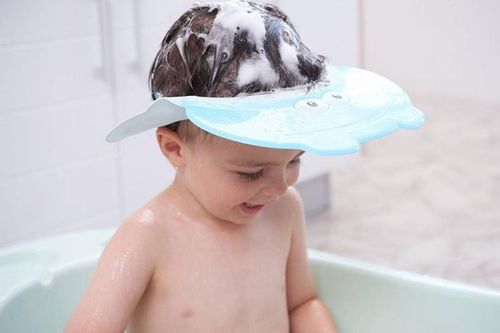
Gội sạch da đầu cho trẻ, nhẹ nhàng xoa bóp với dầu gội dành riêng cho trẻ sơ sinh để làm trôi lớp vảy cũng như loại bỏ những mảng dầu thừa còn sót lại
6. Is there a way to prevent seborrheic dermatitis?
The answer may disappoint many parents, but there's really no way to prevent seborrheic dermatitis in children. Parents of a child cannot prevent seborrheic dermatitis, but washing a child's hair with mild shampoos every few days and brushing a child's scalp with a soft brush can keep seborrheic dermatitis from occurring. back after being under control.7. Should you take your child to the doctor when he or she has seborrheic dermatitis?
In some cases, experts recommend that parents take their children to medical facilities to be examined if the child shows one of the following symptoms:Seborrheic dermatitis worsens goes away and doesn't go away Bleeding in inflamed areas of skin Crib covers the outside of your baby's scalp Rash causing your baby to lose hair Any signs of an infection, such as redness, discharge, fever, or skin that is warm to the touch. Your child may also have other symptoms, such as a rash or signs of thrush. This is the result of a yeast infection. Doctors will then prescribe medications containing cortisone if the scalp is inflamed or use anti-dandruff or anti-fungal shampoos for severe cases of seborrheic dermatitis.

Nếu tình trạng viêm da tiết bã của trẻ ngày càng xấu đi và không thuyên giảm thì hãy đưa trẻ đến gặp bác sĩ ngay
8. What else can cause dry, scaly patches on a child's scalp?
Seborrheic dermatitis, especially in the scalp area, is sometimes confused with eczema (atopic dermatitis). Eczema usually appears in infants and is characterized by dry, scaly patches on the cheeks and scalp, but they can also spread to other parts of the body. Unlike seborrheic dermatitis, eczema can be very itchy and uncomfortable in children.Infantile seborrheic dermatitis causes yellow oily flakes or dandruff-like patches on the baby's scalp. Seborrheic dermatitis is relatively common in children but is easy to treat. Seborrheic dermatitis is not a symptom of any dermatological disease or due to poor care and hygiene for the child. Parents can also completely control the condition of seborrheic dermatitis in children with various measures such as gently massaging the baby's scalp to make the scabs fall off, washing the baby's hair daily or using a shampoo. A number of essential oils of natural origin to brew for babies.
Newborns in general are prone to respiratory diseases, respiratory infections and gastrointestinal infections if they are introduced to solid foods early or the storage and preparation of milk is not guaranteed. To protect children's health, parents should do well to exclusively breastfeed their babies for the first 6 months (if possible) and vaccinate on schedule. As soon as the child shows symptoms such as anorexia, fatigue, crying, it is necessary to take the child to the hospital to be consulted by a specialist for monitoring and treatment. The pediatric department at Vinmec International General Hospital is the address for receiving and examining diseases that infants and young children are susceptible to: viral fever, bacterial fever, otitis media, pneumonia in children. With a system of facilities, modern medical equipment, sterile space, minimizing the impact as well as the risk of disease spread, Vinmec will bring satisfaction to customers. and is highly appreciated by industry experts with:
Gathering a team of leading pediatricians: including leading experts with high professional qualifications (professors, associate professors, doctors, Master's degree), experienced, worked at major hospitals such as Bach Mai, 108.. The doctors are all well-trained, professional, conscientious, knowledgeable about young psychology. In addition to domestic pediatric specialists, the Department of Pediatrics also has the participation of foreign experts (Japan, Singapore, Australia, USA) who are always pioneers in applying the latest and most effective treatment regimens. . Comprehensive services: In the field of Pediatrics, Vinmec provides a series of continuous medical examination and treatment services from Newborn to Pediatric and Vaccine,... according to international standards to help parents take care of their baby's health from birth to childhood. Advanced techniques: Vinmec has successfully deployed many specialized techniques to make the treatment of difficult diseases in pediatrics more effective: neurosurgery - skull, stem cell transplant blood in cancer treatment. Professional care: In addition to understanding children's psychology, Vinmec also pays special attention to the children's play space, helping them to play comfortably and get used to the hospital's environment, cooperate in treatment, improve the efficiency of medical treatment.
Please dial HOTLINE for more information or register for an appointment HERE. Download MyVinmec app to make appointments faster and to manage your bookings easily.
Reference sources: babycenter.com, eczema.org



